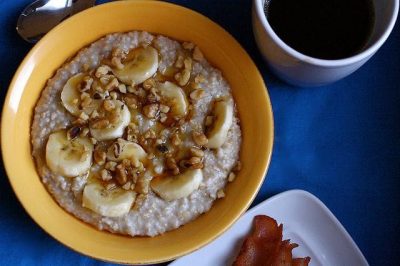Poop, what does it say about you?
Most of us take our digestive system for granted, but it’s a key player in our long term health and how we feel right now. We’ll cover what a healthy poop and digestive system looks like, and how to improve your gut health with everyday foods and practical strategies.
Our digestive tract is deeply intertwined with our nervous system and immune system which makes it key for long term health. This close signalling means that it can put the alarm bells on high (an unhealthy gut can be a trigger for chronic inflammation and the associated conditions) or shift our mood and wellbeing for better or worse (our gut signals our nervous system based on the inputs it is receiving, and it linked in the research to anxiety, depression, and overall mood). We can’t see right inside your gut, but we can use what comes out to give us an idea of how it’s doing.
What makes for a healthy poop?
Easy: First and foremost, a healthy poop should be easy. No straining, pain or discomfort, or intense urgency (as in, if I don’t go now, there’s going to be trouble). Soft, easy to pass and a sense of “completion”.
Frequency: Daily, 1-3 times. Some people are post meal poopers (meaning they have a strong gastrocolic reflex) and may have 2-3 smaller bowel movements daily. Others have one larger BM, as long as you feel like the BM was complete when you finish you’re good. Going less than 1 time per day on a regular basis means stool is sitting too long in your gut, which can lead to dysbiosis (an unhealthy balance of good and bad bacteria), hemorrhoids from straining or pushing, and other issues like reflux and bloating from small intestinal bacterial overgrowth (bacteria are moving backwards up the digestive tract when it moves too slowly).
Appearance: There is a range of normal, but a healthy poop will be soft and somewhat formed. Anywhere from a 4-6 on the Bristol Stool Chart means you’re well hydrated, getting enough fibre, and moving at a healthy rate. Type 1-3 indicates slow transit time and constipation, while type 6-7 indicates things are moving too quickly and you have loose BMs or diarrhea.

Troubleshooting Unhealthy Poops
Constipation: Infrequent, hard to pass, or harder (Type 1-3) poops can be a pain. While there are lots of causes, the first thing you’ll want to do is rule out the basics.
- Get enough fibre from a variety of plant foods (not just fibre pills). Fibre both stimulates your digestive tract to move more quickly and feeds healthy gut bacteria. Having a healthy community of gut bacteria also means you’ll produce less methane (a certain kind of gas produced by some types of gut bacteria) which has a slowing effect on the nerves of the gut when produced in excess. Add leafy greens daily, throw some seeds on your salad, and swap real fruit in for juice to get started. Lots more ideas for upping your food fibre here.
- Check your fluid intake. Drier, harder poops can be a sign of dehydration as your body is pulling most of the water out of your stool instead of leaving some to keep it soft and easy to pass. Most of my clients need 2.5-3.5 L of water, tea, or coffee (up to a couple cups) to meet their needs. Try tracking for a few days and seeing how you do!
- Soften up stools: If you’re going daily but they’re still harder (type 1-3) or uncomfortable to pass try adding chia (my favourite), flax or psyllium flakes daily. Starting at 1 tbsp and working up to 2tbsp if needed. Make sure you have lots of fluids with it, so that the soluble fibre has some fluid to soak up and keep those poops softer.
- Speed things up: If you’re going less than once a day or feel like you’re having to push or strain, a mild stimulant may help to rev up your digestive tract. While not sexy, prunes are a tried and true fix. Start with 1-2 after dinner and increase from there if needed.
If your constipation or hard poops is associated with bloating and pain or discomfort, there might be more going on such as Irritable Bowel Syndrome, Small Intestinal Bacterial Overgrowth or dysbiosis. Make sure you get help with food, and avoid adding supplements or probiotics off the shelf. They may do more harm than good long term if not chosen carefully.
Loose BMs or Diarrhea: Watery, fragmented, and potentially urgent/uncomfortable means that things are moving too quickly. That indicates poor nutrient absorption (you’re not getting all those great vitamins, minerals and antioxidants you’re eating) and can lead to chronic nutrient deficiencies. It also generally indicates a gut that is a bit inflamed and reactive, and likely some issues with the balance of good to bad bacteria. Our goal, slow things down and calm the fired up gut lining.
- Add some soluble fibre like chia or flax – starting small (1-2 tsp) and working up to 1 – 2 tbsp. This will help absorb the extra fluid and slow things down a touch.
- Weed out your supplements if you’re on a whole host of things. Some supplements can cause loose BMs (like turmeric) despite other health benefits, and often my gut clients have added too many things over the years in an effort to feel better. Start with a clean slate and see how things feel.
- Check your ingredient lists – ingredients like inulin, chicory, sorbitol (anything ending in “ol”) are common in “healthy” lower cal or lower carb foods but cause malabsorption in the gut.
- Consider adding an electrolyte or additional sodium (salt) on looser days. The rapid pace means you’re not absorbing enough fluid which can contribute to low energy, a dehydrated gut lining and worse inflammation. Try adding a cup of broth or miso each day, or an electrolyte tablet like Nuun in your water.
- Try removing dairy or going with lactose free for a few weeks. They aren’t evil foods, but are some of the most common triggers in adults. We make less of the enzyme needed to break down lactose (the natural sugar in dairy foods) as we age and so react more strongly to the undigested sugar hitting our lower gut.
- Lower your sugar intake, especially in liquid form. This one is twofold, high added sugar intake feeds the “bad” bacteria in your gut contributing to more issues over time. Two, a high sugar intake draws water into the gut, increasing liquid stools and speeding up transit time (osmotic diarrhea). Pops, juices, flavoured drinks, and most sweetened products will likely make your looser poops worse. This goes for diet soda as well, while lower sugar its overall concentration is still high.
Incomplete: That feeling that you’re not done? That’s called tenesmus. Sometimes it means you’re not passing all of your poop (slowed motility or weaker pelvic floor muscles), and other times it means nerves in that area may have some dysfunction (common after bowel or abdominal surgeries). In both cases you’ll want to work with an RD and potentially a pelvic floor physio to help lessen the symptoms.
We’ve just scratched the surface of gut health here, but it’s one of my favourite topics to nerd out on in part because it’s so vital to how we feel and our long term health. It’s also one of the top things my clients have been struggling with during the stress, uncertainty and overall weirdness of the last couple of months. If your gut has been giving you trouble, you’re not alone! I’d love to hear what questions you have about gut health, bloating, poops or the like – send me an email and let me know what you’re thinking and wondering.
Need some help getting your meals for the week balanced and prepared? If you’d like to receive our free Meal Planning Getting Started Guide AND get in on our weekly emails about all things nutrition so you can get clarity and confidence on what you’re eating, join us here!







